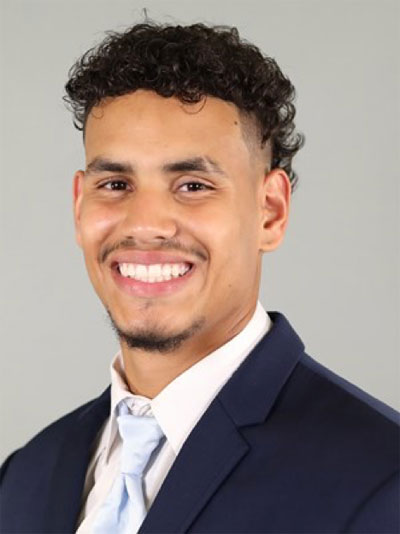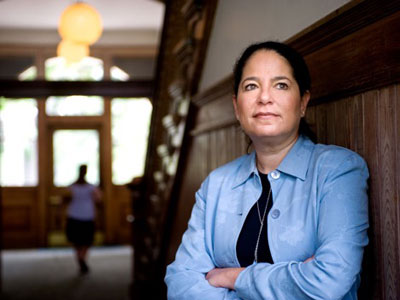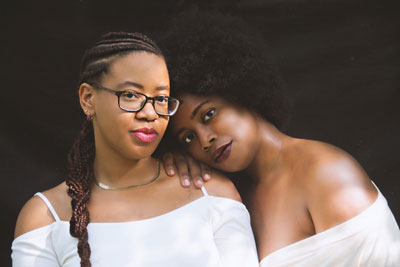Student Spotlight: Sorrell Brown

Sorrell is member of the Green Wave football team and a Junior majoring in Environmental Studies.
Given the perceived clout and social standing of being a collegiate athlete, it is easy to feel as if certain social expectations and limits do not apply to you. This is a dangerous mindset as your actions are magnified so it is crucial that you are always aware and critical of how you act outside of your sport. Sexual assault prevention is important to me because, if not educated, what may at the time be perceived as a harmless act, can leave lifelong mental impacts on the affected person and life altering consequences for the afflicter.
Creating dialogue on sexual assault prevention among young men is essential as it is typically uncomfortable for men to engage in these conversations. Engaging in these discussions and educational opportunities increases the likelihood of a man acting in a respectful manner and being there as an ally to someone who has experienced sexual assault. There is no question that the sexual assault prevention education we have received is important and worthwhile for myself and my teammates.
Want to support Sorrell and his teammates? Mark your calendars for the spring football game at 10 a.m. on Saturday, March 28 in Yulman Stadium!
Faculty Spotlight: Ana Lopez

We started the fall semester with a spotlight of one faculty member who was working on reforms to the faculty sexual misconduct policy, and it’s a great way to start the spring semester, too. This month we want to highlight our colleague Ana M. Lopez, Associate Provost for Faculty Affairs, Professor of Communication, and Director of the Cuban and Caribbean Studies Institute. Dr. Lopez was instrumental in getting the new policy approved by the University Senate. While faculty who center their work on sexual violence are critical, we want to celebrate the faculty who are giving their time and effort to work on these issues and demonstrate so visibly that even if sexual violence is not the center of your work on campus, every person in the community can help create change—and Ana Lopez is so worth celebrating!
Dr. Lopez research is on Latin American/Latino film and media with a transnational scope. Her work has explored transcontinental movements and connections that are not readily visible or available to those within Latin America, where film scholarship has tended to be circumscribed by national concerns. This transnational approach allows her to extend beyond focusing on a single country or period of specialization, giving a broader perspective to the medium.
She describes the evolution of her career from her “early essays and edited collections that include books and special issues of journals that set out new agendas for the field of English-language Latin American film scholarship. As one of a handful of Latin American film scholars in the late 1980s and early 90s trained in film studies, I inserted the Latin American into the mainstream of the field, engaging with pertinent theoretical debates, and challenging many of the standard interpretations and periodizations, while simultaneously acknowledging and debating with Spanish-language Latin American film scholarship. Thus, after working on the New Latin American Cinema, for example, I moved to explore questions of gender and filmic representation in the classical cinema period (1930s-50s), especially in the melodrama, and later in the telenovela, as well as questions of historicity and historiography. My essay “Tears and Desire: Women and Melodrama in the ‘Old’ Mexican Cinema,” initiated the recuperation and serious analysis of the maligned “classical” Latin American cinema and its melodramatic excesses as well as the intervention of feminist film theory into the debates. Similarly, “Setting up the Stage: A Decade of Latin American Film Scholarship” was the first assessment of English language scholarship on Latin American film. Subsequently, I have explored Latin American/transnational stardom (Dolores del Rio), documentary filmmaking, transnational cinematic practices, exilic and Latino cinema, and spatiality and musicality in pieces that have appeared in journals and edited collections. Several of these have been reprinted. A particular important publication was “Early Cinema and Modernity in Latin America,” (Cinema Journal, awarded an honorable mention for the Kovacs essay award in 2001), the first sustained analysis of early Latin American cinema to be published in English and the first to address early cinema as a continental rather than a national phenomenon in any language.”
You can also read Dr. Lopez’s work in the 2012 collected translation of her essays Hollywood, Nuestra América y los Latinos, by Ediciones Unión (Havana, Cuba), her co-edited volume, The Routledge Companion to Latin Ameridan Cinema (2017) or check out the journal that she has been an editor at since 2015, Spanish and Latin American Cinema Studies. Here on campus, Dr. Lopez can be found up in 200 Gibson Hall in her role as Associate Provost or in the classroom…or as a member of the Faculty Sexual Harassment Committee where the passage of the policy was just the first step in the work to improve the climate and culture for faculty and our community.
Honoring Black History Month

In celebration of Black History Month, we are highlighting several upcoming events and opportunities that center the experiences and needs of African-American students and students of color. In addition to these programs, the All In Newsletter is also featuring books, TV shows, and other media that analyze and reflect on the intersections of race and sexual violence.
Featured Events
My Sister’s Keeper
Mondays | 10:00-11:00 a.m.
My Sister's Keeper is an intentional program focused on building community among women of color at Tulane University. In collaboration with Newcomb Institute, Student Conduct, The Office for Gender & Sexual Diversity, and The Well for Health Promotion, we have designed a cohort experience with committed staff and faculty to offer support throughout the program. Issues discussed throughout the program will include strategies for the following: self-empowerment, networking within communities of color, addressing the barriers to success for women of color in higher education, sexuality within communities of color, building healthy relationships, and healing after emotional and physical trauma.
This small cohort experience consists of the following: A regularly scheduled meetup Mondays 10:00 a.m. - 11:00 a.m., Faculty and staff mentorship from departments mentioned above and others, and an off-campus retreat in the spring semester. Applications will be accepted during April of the current academic year. For more information please contact Sienna Abdulahad, Director for the Office of Multicultural Affairs.
Audre Lorde Days
Multiple events throughout Spring 2020
Tulane University's Audre Lorde Days offer multiple opportunities during spring semester for students, faculty, staff, and community members to come together to "develop tools for using human difference as a springboard for creative change." These may include academic lectures, workshops, concerts, comedy, or other experiences and are held throughout the spring semester. Admission to all events is always free and open to the public.
Like the work of Lorde herself, the experiences combine critical analysis and love, lyricism and research, as well as struggle and collaboration (1) to address the ways in which inequity, bias, discrimination, alienation, and violence undermine our individual, collective, and planetary health and (2) to develop holistic analyses and strategies for fueling well-being, justice, and positive social change. Central to all events will be a consideration for how students, researchers, faculty, staff, and communities can create meaningful, reciprocal, accountable, and thriving relationships within the context of racism, sexism, heteronormativity, economic disparity, homophobia, transphobia, xenophobia, and town/gown divides.
This series is sponsored by the Office of Gender and Sexual Diversity, along with multiple campus collaborators such as the Office of Multicultural Affairs, the Gender & Sexuality Studies Program, and various student organizations. If your department or organization is planning an event which would fit the parameters of Audre Lorde Days, contact Petey Peterson, Director for the Office for Gender & Sexual Diversity, to discuss collaboration and co-sponsorship.
Afrosexology Workshops
Afrosexology: Exploring Your Erotic Black Self
Thursday | 6:00-8:00 p.m. | Rathskeller Lounge
Come join Finding Intersectionality Together and The Well for Health Promotion for "Exploring Your Erotic Black Self." This workshop facilitated by Afrosexology will aim to define your erotic self and strengthen your sexual voice while challenging "the do's and don'ts" of Black sexuality. From erotic porn to candlelit baths, explore what stimulates you and leads to the discovery of your authentic and most erotic self. Together we will:
- Explore different forms of eroticism
- Discover ways to get in tune with your erotic self
- Create your Erotic Care Plan
*Note that this workshop is a POC-only space.
Afrosexology: Less Oppression, More Orgasms
Friday | 6:00-8:00 p.m. | LBC, Stibbs
Come join Finding Intersectionality Together and The Well for Health promotion for Less Oppression, More Orgasms, a workshop presented by Afrosexology. Historically, Black people have been told that they are asexual, hypersexual, sexual deviants, a sexual fantasy, and unrapeable. These messages are often internalized and leave feelings of being unlovable, unworthy, and devalued. To challenge those myths, reclaiming pleasure is necessary. Together we will:
- Learn about living a life of pleasure as a form of resistance
- Explore how oppression has impacted our ability to be present in our bodies
- Reclaim our erotic power through completing several individual and group activities
What We’re Reading and Watching
At the Dark End of the Street: Black Women, Rape, and Resistance – a New History of the Civil Rights Movement from Rosa Parks to the Rise of Black Power by Danielle L. McGuire describes the intersections of sexual violence and the Civil Rights movements (2010, Vintage). Focusing on the 1940s through the 1970s, McGuire details how white authorities and citizens used sexual violence as a tool to oppress and terrorize black community members in the Jim Crow South. Black women were regularly raped by white men and struggled to find justice within corrupt and racist criminal justice systems. At the same time, black men were regularly falsely accused of rape, a terrifying and devastating method of intimidation that also served to incite white violence against black communities, including lynchings. McGuire argues that efforts to organize to resist this violence and injustice helped to spur the Civil Rights movement. McGuire uses several case studies to illustrate this history, including detailing Rosa Parks’s early work to investigate, publicize, and organize around the rape of Recy Taylor. Through these stories, McGuire illuminates the black women who testified to the violence they experienced and the network of organizers and allies who amplified their voices as they all struggled for justice.
Patricia Hill Collins also highlights the intersections of sexual violence and race in a chapter entitled “Assume the Position: The Changing Contours of Sexual Violence” in her book Black Sexual Politics: African Americans, Gender, and the New Racism (2005, Routledge). Hill Collins states, “together, lynching and rape served as gender-specific mechanisms of sexual violence whereby [black] men were victimized by lynching and [black] women by rape” (p. 216). Lynching, frequently spurred by false accusations of sexual harassment or violence and fears of racial miscegenation, served to figuratively (and sometimes literally) emasculate black men after the Civil War. Hill Collins argues that the prison-industrial complex, which serves as a modern-day form of subordination like slavery and Jim Crow before it, utilizes sexual violence as a further means of controlling black men. Meanwhile, black women were subjected to sexual harassment and violence from white men throughout slavery and the Jim Crow era and are still frequently the victims of sexual violence today. However, modern black victims often face a dilemma when deciding whether to speak out: if the violence was perpetrated by a black man, the victims risk reinforcing negative stereotypes of black men and black women. Ultimately, Hill Collins argues that to end sexualized violence against black men and women, we must analyze the violence through an intersectional lens.
Her name might be Miss Major Griffin-Gracy but you may call her “Mama.” MAJOR!, an award-winning 2016 documentary follows the life and campaigns of Miss Major Griffin-Gracy, a 73-year-old Black transgender woman who has been fighting for the rights of trans women of color for over 40 years. Miss Major’s personal story and activism for transgender civil rights, from mobile outreach and AIDS prevention to fighting the prison industrial complex, intersects LGBT struggles for justice and equality from the 1960s to today. More than her living political legacy, Miss Major life’s story is a testimony to the healing and transformative power of caring for and loving your community. This intimate portrait of a community advocate, activist icon and surrogate mother to many, as one anonymous author wrote, “give[s] us visions of a world to keep moving toward, collectively and with joy.” For a special showing of Major!, join OGSD’s Audre Lorde Days at a special showing on Thursday, February 13, 2020 from 6:00-8:00 PM in the Rathskeller Lounge.

Apply for a Student Grant!
Students and student organizations can now apply for grants to fund projects, events, initiatives, and internships related to sexual violence. Applications are reviewed on a monthly basis during the fall and spring semesters.
Click here to learn more and apply.
Other Upcoming Events
An Interdisciplinary Symposium on Sexual Violence
February 7 | 8:00 a.m. – 6:30 p.m.
Newcomb Institute, the Commons
Please join the Newcomb Institute for a symposium on sexual violence, featuring the latest research by leaders in the field; we will approach the issue from a variety of perspectives, including historical, legal, psychological and more. Confirmed speakers include: Mary Koss, Ray Douglas, Jennifer Freyd, Crystal Feimster, Donna Freitas, Catherine Jacquet, and Donna Coker. A detailed schedule is available here. For more information, please contact Laura Wolford.
MENtality Project Leadership Cohort
Multiple events throughout Spring 2020
Interested in leadership and healthy masculinity? The MENtality Project Leadership Cohort is designed to promote community dialogue for students interested in learning more about healthy masculinity. The program will be approximately 6-7 weeks in duration, beginning in early March and ending in late April. A free meal will be provided at each meeting.
Applications are due by 11:59 p.m. on Sunday, Feb. 9. You will be notified no later than Feb. 12 if you have been accepted. You can view the application here.
Please contact Anthony Ciliberto with any questions.
Sex Week
February 10-16
Sex Week will bring together the campus community and a diverse set of programming to create a week of comprehensive, queer-inclusive, culturally-situated, sex-positive sexual health events and conversations. The programming will consist of lectures, workshops, social activities, educational materials, and installations around Tulane’s campus. We hope to bring together voices from all areas of campus life to join the conversation about sexual health and pleasure. Click here for more information about individuals events. To get involved, contact Kate Kushner.
